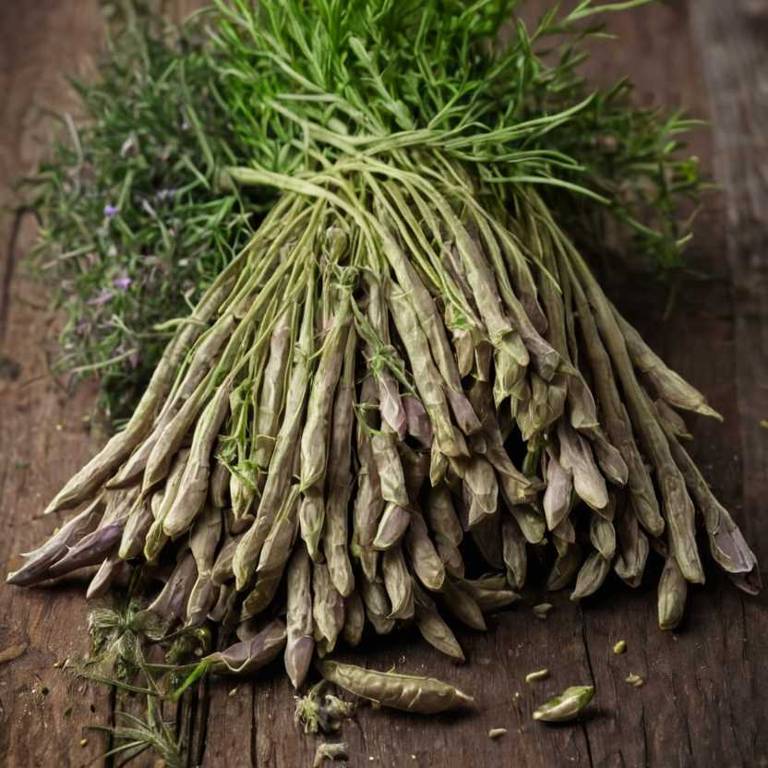Shatavari (Asparagus racemosus)
Shatavari (Asparagus racemosus) is a member of the Asparagaceae family, native to India, Nepal, and Bhutan. Traditionally, its rhizomes, stems, and shoots have been used for decoctions, infusions, and powders.
This herb is particularly valued for its tonic, diuretic, and anti-inflammatory actions, and has a long history of use in ayurvedic medicine, unani medicine, and tibetan medicine.

Quick Facts / Key Information
| Common Name | Shatavari |
|---|---|
| Scientific Name | Asparagus racemosus |
| Plant Family | Asparagaceae |
| Genus | Asparagus |
| Species | racemosus |
| Native Range | India, Nepal, Bhutan |
| Plant Parts Used | Rhizomes, Stems, Shoots |
| Primary Medicinal Actions | Tonic, Diuretic, Anti-Inflammatory |
| Primary Traditional Systems | Ayurvedic Medicine, Unani Medicine, Tibetan Medicine |
| Historical Preparation Methods | Decoction, Infusion, Powder |
Botanical Identity
- Scientific Name
- Asparagus racemosus
- Common Name
- Shatavari
- Synonyms / Alternative Names
- Asparagus, Indian Asparagus, Kachnar
- Plant Family
- Asparagaceae
- Genus
- Asparagus
Botanical Description
- Growth Habit
- Perennial herbaceous plant.
- Height
- It typically grows to a height of 1 to 2 meters.
- Leaves
- Broad leaves with upper surface green and lower surface pale green, featuring prominent stomatal bands along the midrib.
- Flowers
- Flowers are actinomorphic, yellow with white markings, arranged in racemes, having six tepals fused at the base, and three stamens with distinct anthers.
- Stems
- Cylindrical, woody, branched, with nodes and internodes, surface covered with small, stiff, uniseriate hairs, growth habit erect, branching pattern dichotomous, leaves opposite.
Traditional Uses / Historical Use
Traditional Systems
- Ayurvedic Medicine
- Unani Medicine
Historical Preparation Methods
- Decoction
- Infusion
- Powder
Medicinal Actions
- Tonic
- In herbal texts, considered a moderate tonic, in whole-system applications.
- Diuretic
- Traditionally described as a gentle diuretic, in urinary system discussions.
- Anti-inflammatory
- Historically regarded as a cooling anti-inflammatory, for general calming applications.
- Carminative
- As described in traditional systems, a soothing carminative, in stomach-related herbal uses.
Active Compounds
- Flavonoid
- Plant-based polyphenolic compounds frequently distributed throughout aerial plant parts.
- Saponin
- A chemical class frequently identified in herbaceous and woody plants.
- Glycoside
- Naturally occurring metabolites distributed across many plant species.
- Phenolic Acid
- A class of aromatic plant compounds commonly found in leaves, seeds, and stems.
Modern Research Overview
This section is reserved for future summaries of scientific research related to this plant. As additional verified sources are reviewed, relevant study information will be added here.
Safety & Contraindications
- General Precautions
- Caution is advised in certain contexts based on traditional use and available information.
- Contraindications
- Specific contraindications associated with this herb have not been well documented.
- Allergies
- Allergic reactions associated with this herb have not been well documented.
- Drug Interactions
- The potential for interactions with prescription medications has not been extensively studied.
- Toxicity
- There is insufficient evidence to determine the toxic potential of this herb.
- Pregnancy & Breastfeeding
- Use during pregnancy or breastfeeding has not been clearly established in available sources.
Preparation & Usage Methods
- Infusion
- A preparation method involving steeping plant material in heated water for a short period.
- Decoction
- Plant parts are gently boiled in water to release soluble constituents.
- Poultice
- A topical preparation made by applying softened plant material externally.
- Powder
- A preparation created by pulverizing dried plant material.
- Tincture
- Tinctures are liquid extracts produced through alcoholic maceration.
Growing, Harvesting & Storage
Growing / Cultivation
- Soil
- Prefers loamy soil with well-drained conditions. Typically grows best in high organic matter soils.
- Sunlight
- Thrives in partial sun. Tolerates full sun to partial shade.
- Watering
- Prefers well-balanced moisture levels. Tolerates periodic dry conditions.
Medical Disclaimer
The information provided on this page is for educational and informational purposes only. It is not intended to diagnose, treat, cure, or prevent any medical condition. Always consult a qualified healthcare professional before using any herb for medicinal purposes.